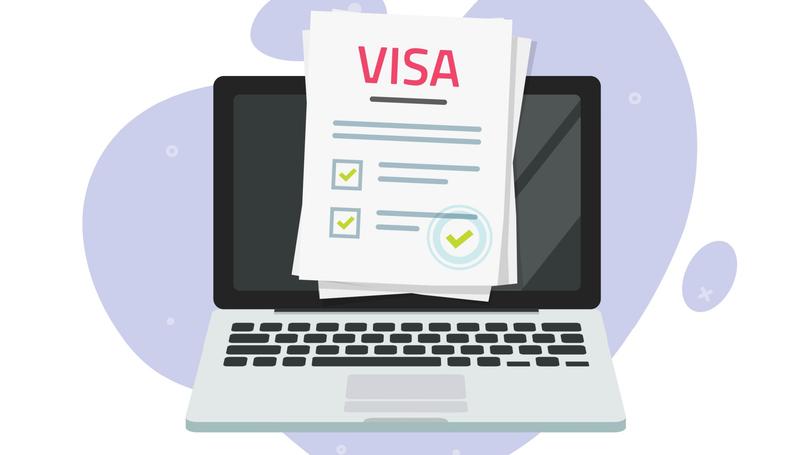Digital Nomad Visa

What is a digital nomad?
A digital nomad is someone who blends remote work with global travel, rarely staying in one place for too long. This term emerged around five years ago. Digital nomads use laptops, smartphones, or tablets with high-speed internet to work, travel lightly between countries with just a suitcase or travel around in a caravan. Their income remains stable as they perform their tasks like other professionals, provided the job supports remote work and offers a flexible schedule. Digital nomads are frequently IT specialists, bloggers, marketers, copywriters, or coaches, though many other professions can also fit this lifestyle. They might be corporate remote employees with a steady income, freelancers working on various projects, or entrepreneurs managing online businesses.
On average, digital nomads typically stay in one location for no more than two months, though some may settle in a place for up to a year. This largely depends on individual preferences and practicalities, such as visa regulations. While some countries have strict entry limits and will not allow you to stay long, others actively welcome digital nomads by offering special "digital nomad visas".
What is a digital nomad visa?

A digital nomad visa allows you to live and work in another country for longer than a regular tourist visa permit, but not as long as a resident visa. These visas often come with special tax schemes and benefits, and most importantly, they grant permission for long-term residence and renting housing without the need to leave the country until the digital nomad chooses to do so. It's important not to confuse these with work or educational visas, as digital nomad visas are relatively new and totally independent separate programs.
Typically, a digital nomad visa provides you with:
-
Official recognition as a "digital nomad," now legally acknowledged by over 40 countries.
-
A tax exemption for a specified period.
-
Automatic authorisation to travel within the country and unrestricted entry and exit.
-
Exemption from needing a work permit in some cases (though some countries with this status may prohibit working for local companies, requiring you to have an external source of income).
-
The ability to register as a legal entity, open bank accounts, and sometimes engage in financial transactions and register as an individual entrepreneur.
Naturally, this list can vary by country, as no unified international law governs digital nomads. Each country independently sets their rights and responsibilities. It's important to note that digital nomad visas are often quite expensive, and not all permit your family to accompany you. This means that, in some cases, you'll need to apply for a separate visa for each family member or demonstrate that they also meet the eligibility criteria, such as having a regular source of income like yours.
Note! Most visas are valid for one year, but many can be extended up to three years at the digital nomad's discretion.
Digital nomad visa requirements
As previously mentioned, each country issues visas individually without any standard outlines. Therefore, the requirements for a digital nomad visa will vary from country to country. Still, the minimum set of documents typically includes:
-
A visa application for a particular country. The form is normally available for download from the embassy's website to be filled out and signed in duplicate, similar to a standard visa application. In some cases, you can apply for a digital nomad visa online without needing to print anything.
-
A recent colour photograph. With a clear background, showing your face unobstructed, and meeting the size requirements of the specific country.
-
A valid passport. It must be valid for the entire duration of the visa plus an additional three months. Ensure it has at least two blank pages. If needed, consider renewing your passport in advance.
-
A certificate of no criminal record.
-
Income certificate. To ensure you can cover your expenses while residing in a new country, it's crucial to demonstrate a stable source of income. Each country sets its own minimum income requirements; some may stipulate that this income must originate outside their borders. Acceptable forms of proof include a certificate from your employer detailing your monthly salary (if you are a corporate employee), bank statements, tax payment certificates, records of fund receipts, and certificates of deposit.
-
Medical insurance. Many countries offering digital nomad visas require applicants to have medical insurance immediately with a stipulated coverage amount, which they determine individually. Regular travel insurance typically does not meet these requirements.
-
Confirmation of rental housing. The consulate will require proof of your planned accommodation. This housing must be long-term, such as a lease paid for a year in advance.
Nowadays, all applications can be submitted online using the designated forms on the consulate's website. Alternatively, you can send them by mail, extending the processing time.
Important! Suppose you are relocating with your family. In that case, you must either provide similar documents for each member separately or include certificates proving that you can also cover their expenses.
Countries with digital nomad visas

As of 2024, over 40 countries offer digital nomad visas. Examples include Malaysia, Thailand, Greece, Croatia, Bali, Colombia, Germany, Italy, and Canada. Additionally, some countries provide preferential tourist visas for long-term stays, temporary residence visas, or freelancer visas. In summary, there are many more than forty countries where you can live as a digital nomad. Let's explore the general conditions of those offering the best digital nomad visas.
Antigua and Barbuda
This program, known as Nomad Digital Residence, offers two-year long-term residency on both islands at a cost of approximately $1,500 per person. For families with more than three members, an additional fee of $2,000 to $3,000 is required. To obtain the visa, you must submit 11 documents, including proof of an annual income of at least $50,000.
Bahamas
This program for digital nomads is called the Extended Access Travel Stay program. It allows you to live and work remotely in the Bahamas for one year on any of the 16 islands in the archipelago. The application fee is just $25, but once approved, an additional $1,000 is required for a "remote work permit." The application process takes only five days and does not demand yearly or monthly income. If you travel with dependents, an additional $500 per person is required.
Barbados
Barbados offers digital nomad visas for up to one year. The application fee is $2,000 for individuals and $3,000 for families of two or more. Applicants must submit two 50 x 50 photographs, a completed biography page, and essential documents such as a passport or proof of relationship with dependents. The primary requirement is to have an annual income of $50,000 or to demonstrate that this income is expected for the next 12 months of your stay.
Bermuda
Bermuda offers the Work From Bermuda certificate, valid for one year, for $263. To qualify, you must have insurance and documents confirming employment. There are no minimum salary requirements, but each application is reviewed individually. If you are relocating with a large family, you may need to provide evidence of how you will support them. Additionally, applications for all family members must be submitted together on the same day.
Cape Verde
Only some people can get a digital nomad visa here. This digital nomad visa is available only to those officially employed remotely by companies in Europe, North America, the Community of Portuguese-speaking countries, or the Economic Community of West African States. Applicants must have maintained a minimum balance of $1,500 per person in their bank account for at least the last six months to demonstrate financial stability. Upon arrival, you must personally present copies of all required documents to the authorities. This visa is valid for six months but can be extended for another year.
Costa Rica
In Costa Rica, this visa is known as an Estancia. Applicants must have a monthly income of at least $3,000 or $5,000 if moving with dependents. The application fee is $100; you must provide bank statements and health insurance. Once the Estancia expires, you can apply for a residence permit if desired.
Curaçao
Remote workers are granted a six-month residency, which can be extended for an additional six months. Citizens of the United States and the Netherlands do not need a visa. They can stay in Curaçao for six months as regular tourists. Non-citizens of these countries must apply for a visa at a cost of $294 and prove their financial solvency. However, there are no specific eligibility requirements. All applications must be submitted individually under the name of the primary applicant.
Dominica
Dominica, a natural island in the Caribbean, offers digital nomads an 18-month visa, allowing ample time to enjoy its beautiful wilderness. Applicants must have an income (income requirements) of at least $50,000 over the next year. The application fee is $100, with an additional $800 if the visa is approved (or $1,200 for families). Visa applications are processed within 28 business days.
Czechia
Obtaining a Zivno visa is more challenging than it is in other countries on the list. Applicants must confirm a minimum income equal to 1.5 times a Czech citizen's gross average annual salary, as determined by the Ministry of Labour and Social Affairs. This amount changes annually and typically increases. Additionally, only citizens of Australia, Japan, Korea, New Zealand, the USA, Israel, Singapore, Canada, or the UK are eligible to apply. The visa is valid for one year and can be extended upon expiration.
Estonia
Estonia introduced its digital nomad visa in 2020, likely in response to the global shift towards remote work due to the coronavirus pandemic. This visa allows you to live in Estonia for a year, provided you can demonstrate an annual income of $42,000. The application fee is $100. While health insurance is not required, your employer must be based outside Estonia, or you must be a freelancer. There are also separate visas available for entrepreneurs. The processing time for approval or refusal of the application is one month.
Iceland
The digital nomad program in Iceland is available to citizens of countries that do not require a tourist visa to enter. This excludes citizens of the EU, the European Economic Area, and the European Free Trade Association. If your citizenship allows you to visit Iceland without a visa, you can also live there almost permanently. The visa is issued for up to 180 days if you apply from outside the country, and a maximum of 90 days if you apply from within Iceland. You must prove a monthly income of at least 1 million ISK, or 1.3 million ISK for married couples. There is an additional processing fee of 12,200 ISK.
Malta
In Malta, the Digital Nomad visa allows non-EU citizens to live and work for up to one year, possibly extending it up to three times (for a maximum of four years). Applicants must have a monthly income of at least €3,500, health insurance, a valid long-term lease or purchase agreement, and pass a background check. Documents are submitted via email, and an entry fee invoice for €300 per person will be sent upon receipt.
Spain
To obtain a digital nomad visa in Spain, as in the case of Malta, you must not be a citizen of Switzerland, the European Union, or the European Economic Area. Applicants must have a monthly income of at least €2,520, work under a contract or as a freelancer, and provide health insurance. Alternatively, you can enter Spain on a tourist visa and apply for a residence permit in the EU, allowing you to stay in all EU countries for three years, possibly extending it for another two years.
In this case, your company must have been established for at least one year. If you own a business, it must have been operational for at least three months. Additionally, you must be present in the country for up to six months per year, or the visa will be revoked. The application is reviewed within 30 days.
Mauritius
While there isn't a specific "digital nomad visa" here, the premium tourist visa is worth mentioning and adding to the list. It allows for a year of remote work with the possibility of extension. It is entirely free, making it the most affordable option for digital nomads. Applicants only need to submit a standard application and have health insurance. The required monthly income is at least $1,500, which is relatively modest compared to other countries offering similar visas. Additionally, applications are processed within 48 hours of submission.
Brazil
Brazil is a popular destination for digital nomads due to its straightforward visa process. The required minimum income is $1,500 per month, like Mauritius. If your current income doesn't meet this threshold, you can show savings of $18,000. You can include your spouse and children under 19 on the visa without increasing the required income. This visa is valid for one to two years. If you stay in the country for another two years (totalling four years), you can apply for citizenship.
Portugal
To obtain a digital nomad visa in Portugal, you must not be a citizen of an EU, EEA, or Switzerland. Applicants must be freelancers or work for a company based outside of Portugal. You must demonstrate an average monthly income for the last three months of at least four times the minimum wage in Portugal, which is approximately €3,040 per month as of 2023. Additionally, you must have savings of at least €9,120 per person in a bank account and purchase health insurance with coverage of €30,000 per person for hospitalisation.
South Korea
South Korea introduced its digital nomad visa in January 2024, and the program is still considered a trial. It aims to attract new foreign professionals to the country. The requirements are as follows: your annual income must be twice Korea's gross national income per capita for the previous year, which is about $5,500 per month. You must also confirm your status as a remote employee for at least a year and provide health insurance. This visa allows you to live in South Korea for up to two years with your spouse and children under 18.
Japan
To live and work as a remote worker in Japan, you must have an annual income of 10 million Japanese yen and pay a 3,000-yen application fee. This visa allows you to stay in the country for up to six months. Only citizens of the 49 countries with which Japan has tax and trade agreements are eligible to apply. Statistics show that these visas are primarily issued to US citizens.
Note! If you hold a passport from a European country, you may not need any special permission to live and work in any EU country for up to a year. Additionally, you might be eligible for a simplified procedure to obtain a European digital nomad visa.
Conclusion

Becoming a digital nomad can be challenging, but obtaining a visa is often more straightforward than it first appears. Many countries are considering launching new digital nomad visas. The key is to stay informed and don't miss out on anything. Ensure you visit the consulate's website to review all mandatory requirements and documents. Additionally, we recommend contacting the digital nomad community in your desired country and speaking with those who have already navigated the visa process.
Your application is typically approved in about a month. You will receive an email notification of approval or refusal. Ensure all your documents are current; some with wet seals are only valid for a month. If possible, consider consulting an immigration lawyer to assist with the paperwork and address any necessary issues. And don't forget to plan your trip!























